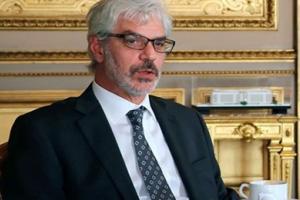Télam National News Agency 10/25/2020
Interview with the Ambassador to the EU, the pandemic "has opened other possibilities for cooperation" Pablo Grinspun said this Sunday that "from the pandemic, shared values have opened other possibilities for cooperation" between that regional bloc and Argentina and assured that there is "a very broad agenda with the EU, which covers practically all of the public politics".
By Laura Capriata
"Trade with the EU does not escape the general rule of an unprecedented decline in global trade," Grinspun said. The Argentine ambassador to the European Union, Pablo Grinspun, has worked in Brussels since 2016, when he was appointed ambassador to the Kingdom of Belgium and the Grand Duchy of Luxembourg, but since last June he has been working in that city (headquarters of the main government bodies of the EU) as Argentine ambassador to the European bloc, and from where he held a virtual interview with Télam.
Télam: Was Brussels affected in the daily work of EU bodies by the coronavirus pandemic?
Pablo Grinspun: Clearly. In Brussels, as almost everywhere else, the pandemic has hit very hard. The EU was very quick and forceful in its response to such a situation. In mid-March, the European institutions suspended the face-to-face meetings first, and the following week remote work had already been arranged in all the dependencies of the areas of the EU administration (European Commission, European Council and European Parliament). Since then, they have not returned to normal. The European Parliament remains closed to anyone who does not work there, while the Commission works in person and on a rotating basis, between 20 and 30% of the staff.
T: What is the mission entrusted to you by the President and the Chancellor?
PG: We have a very broad agenda with the EU, which covers practically all public policies. We share universal values such as democracy, the defense of human rights, including policies on gender and diversity, the defense of multilateralism and the rule of law. It is one of our main business partners and main investor. Historical, economic, cultural and family ties unite us with Europe. They have asked me to deepen the relationship, based on these common bonds and values.
T: How is Argentine trade with the EU today and what are the expectations in a context of a huge drop in international trade due to the pandemic?
PG: Trade with the EU does not escape the general rule of an unprecedented decline in global trade. However, according to figures from European sources, in the first half of 2020 compared to the same period of 2019, our exports to the EU not only did not fall but also increased by 3%, exceeding 3,200 million euros. One explanation is that the period considered takes only the first months of the pandemic and that also food and agricultural products in general are among the few that were saved from a precipitous drop in international trade. On the side of Argentine imports of European products, in the same period, there was instead a fall of more than 25% accompanying the trend of Argentine imports from all over the world, which gives us, for the first half of this year, a favorable balance for our country in more than 500 million euros. It should be remembered that European countries have supported renegotiation from the beginning, and that was the message that President Alberto Fernández took when, before the start of the pandemic, he visited the leaders of Germany, France, Italy, Spain and Portugal.
T: Will the pandemic imply an opportunity or a setback in the relationship?
PG: Since the pandemic, shared values have opened up other possibilities for cooperation between both spaces. And this is not limited to the health issue. The pandemic creates challenges in all spheres of public action, deepening inequalities both within States and internationally. The way in which it is thought and seeks to respond to these social, educational, access to technology problems, protection of human rights, among others, are also meeting points.
T: How will scientific cooperation continue after the collaboration in the manufacture of the Covid-19 vaccine?
PG: Scientific and technological cooperation goes far beyond COVID-19. We have a Scientific and Technological Cooperation Agreement in force since 1999, in which framework, the Mixed Commission of said Agreement meets periodically to implement a work agenda. Such is the importance of bilateral scientific cooperation that a liaison table with the European Union operates in the Ministry of Science and Technology to deal with this extensive agenda.
T: Does the UK's new place in the EU benefit us on the Malvinas issue? What will be the guideline in that regard?
PG: While the United Kingdom was part of the European Union, its position on the sovereignty dispute had to be assumed and defended by European organizations. Regardless of the format of its future relationship with the bloc, since January 31 of this year the United Kingdom is no longer part of the EU and no longer participates in the formation and decision of political positions. We believe that this will allow the European Union to better listen to our claim, and, eventually, to support efforts towards a final peaceful resolution. In this sense, the guideline does not differ: we continue to claim our sovereignty, presenting our historical, political, legal, geographical and human arguments at every opportunity and appealing for a peaceful and consensual solution
T: What was the impression in Europe after the Argentine agreement with the bondholders and what role does the EU play in the IMF?
PG: The comments I have received from different European officials highlight and celebrate the agreement reached with the bondholders. It should be remembered that European countries have supported renegotiation from the beginning, and that was the message that President Alberto Fernández took when, before the start of the pandemic, he visited the leaders of Germany, France, Italy, Spain and Portugal.
Full interview: http://ow.ly/W3th50C2zwx


